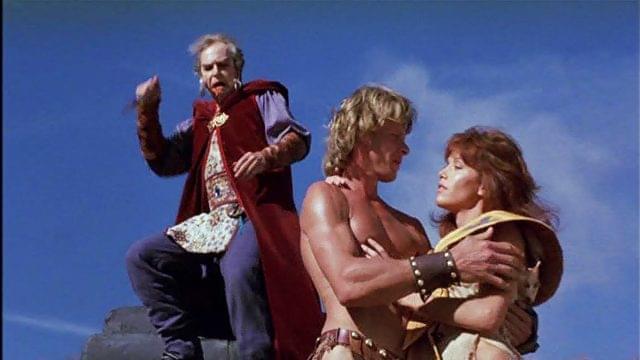
It is no surprise that “The Beastmaster” is goofy and lame, as this is the case with about 95 percent of movies involving swords, wizards, and/or loincloths. A film producer who sees an expenditure for loincloths on his movie’s budget should immediately rethink his investment. What is a surprise is that the film’s real stars are a pair of ferrets, who are smarter and more expressive than the human star and perform more heroic acts than he does. I don’t think any of us saw that coming.
The non-weasel protagonist is named Dar, possibly because this is the sound he utters when asked a difficult question. He is played by Marc Singer, who would later gain notoriety as star of the “V” TV movie and series. Like so many protagonists in so many sword-and-sorcery movies, Dar is beefy, tan, dim-witted, and prone to making unwelcome advances on ladyfolk based on the faulty premise that he is irresistible and charming. In a more enlightened age, Dar and his ilk would be considered sexual predators. But “Beastmaster” is not set in an enlightened age. It’s set in whenever the hell it’s set, like a thousand years ago or something.
We begin with a small coven of hideous witches cackling and making dire proclamations, just as in Shakespeare’s “Macbeth” or ABC’s “The View.” The witches prophesy that the king’s conniving high priest, Maax (Rip Torn), will die at the hand of the king’s son. Maax figures the smart thing to do, then, is to kill the king’s son now, while he has the chance. Only problem: The king’s son is currently residing in the queen’s womb, to which Maax has precious little access.
Maax employs one of his witches to sneak into the royal bedchamber, paralyze the king and queen with a fluorescent green goop, then magically transfer the fetus from the queen’s uterus into a cow’s uterus. Having accomplished that, the witch takes the cow out back and slices it open to remove the baby, which makes you wonder why she didn’t just do that to the queen. For that matter, why not kill the queen AND king, since Maax’s goal is to usurp the throne anyway, and since the royal bedchamber is apparently unguarded and easy to sneak into?
But we can’t waste our time with questions like that or we’ll be here all day. The point is, baby Dar is ripped from the cow’s womb and about to be sacrificed by the witch when he is saved by a passing peasant, who kills the witch using about one-tenth the effort the witch would have needed to kill the royal family in the first place. Honestly, with the incompetence and inefficiency of these evil minions it’s a wonder any thrones ever get usurped. The peasant takes the baby back to his poor village and raises him as a son, taking care to teach him the fine arts of sword-waving and loincloth-wearing.
Back in the city, I don’t know what Maax thinks happened. All he knows is that the queen isn’t pregnant anymore and one of his hags is missing, which sounds like the plot from a “Lord of the Rings” After School Special. At any rate, years pass, and Dar grows up into Marc Singer, and Maax — who has now successfully usurped the throne and imprisoned the king — coincidentally sends his death squad to Dar’s village to slaughter everyone. Dar survives the attack and vows revenge on Maax, unaware that he has other reasons for hating Maax, too, i.e., his forced migration from womb to womb while in utero.
Dar goes off into the wilderness to “train,” which means standing on hilltops and swinging a sword around. He also works on his beast-mastering abilities — it would seem that his brief stint in a bovine uterus has given Dar the power to communicate telepathically with animals. Well, sometimes telepathically, and sometimes vocally, as when he caws to an eagle in what is apparently the eagle’s native tongue, though it sounds to me like he’s just doing a parody of an eagle’s caw in a way that would probably be offensive to real eagles. And Dar doesn’t just communicate with animals, either. The animals OBEY him. That’s why he’s the Beastmaster.
So Dar spends a lot of time master-beasting. In addition to the eagle, he beast-masters a black tiger and a couple of ferrets. He meets these ferrets when they steal his leather loincloth belt, and he pursues them through the woods and falls into some quicksand, whereupon the ferrets rescue him, and one of the ferrets falls into the quicksand in the process, and Dar almost forgets to save it, because Dar the beastmaster is an ungrateful bastard-master.
He next uses his tiger friend in a ploy to frighten a young maiden he finds bathing topless in a lake. Dar “rescues” her from the fierce beast, then kisses her without permission, then is upset when she martial-arts him to the ground and puts her knee to his throat. “I am no danger to you!” he cries, which is more or less what most sexual predators say (or so I understand). The woman’s name is Kiri (Tanya Roberts), and she says she’s a slave belonging to Maax, and that if she doesn’t return home from her topless bathing, Maax will kill her family. This gives Dar even MORE reason to defeat Maax. You start to wish the movie would quit piling up motivations for Dar and just let him get on with the overthrowing.
But no, instead we get scene after scene of Dar and his beast-mastered beasts just walkin’ around, lookin’ at stuff. I confess that this is not particularly interesting. Dar does not have what you’d call a magnetic personality even under the best of circumstances, and wandering alone through the desert would make anyone seem dull, no matter how much master-beasting they do.
Finally he meets Seth (John Amos, aka the dad from “Good Times”), who was the deposed king’s top adviser, and Tal (Josh Milrad), a young boy who says he’s the king’s son, which means the king and queen had another child after Dar mysteriously vanished from the queen’s womb that fateful night. Seth and Tal team up with Dar to fight Maax, returning to the city just in time to find Maax sacrificing a young child to his pagan gods. This violates an unwritten rule of movies about children not being killed; the fact that “The Beastmaster” was rated PG, despite its healthy serving of boobs, violence, and kinderslaughter, is evidence that the MPAA was just as useless in 1982 as it is now.
Dar is glad to witness one child being sacrificed, but he draws the line at two. As Maax tosses the second one into the fire from atop a pyramid, Dar saves the child! Well, OK, he tells the eagle to do it. But it was totally Dar’s idea! Then there’s a lot of time-wasting and Maax-not-defeating, and the king gets rescued from prison (the queen, presumably dead, is not mentioned). All of this is thanks at least partially to Dar’s efforts, though, again, the animals really did most of the work. The king is blind now (echoes of Shakespeare’s “King Lear”!) and rejects Dar’s help on the grounds that Dar is a beast-mastering freak. “Go crawl down a hole with your animals!” the king says, unaware that the freak he rejects is his own son, which is the kind of irony Shakespeare would have enjoyed, particularly if he was stoned.
Eventually there’s a big fight between Maax’s minions and the townspeople, rallied to rebellion by Seth. Maax kills the king (FINALLY) and has a sword fight with Dar, who wounds Maax but does not bother to kill him because he (Dar) is a giant moron. Naturally, Maax regains his strength when Dar’s back is turned. As he comes at him from behind, one of the ferrets leaps to Dar’s aid, biting Maax on the neck, throwing him off balance, and sending both villain and ferret plummeting into the fiery sacrificial barbecue pit. Dar is very sad at the loss of his ferret friend, and so is the other ferret, who I pictured squeaking “I don’t want to live!” and hurling herself after her mate.
Now, if you were paying attention at the beginning of the movie, you’ll recall that the witches’ prophecy was very specific: Maax would die at the hand of the king’s son. Well, unless the king sired a ferret when we weren’t looking (and goodness knows what sort of things went on in this unspecific land in this unspecified time period), this prophecy has proven to be false. Dar didn’t kill Maax. As usual, Dar didn’t really do anything.
That’s the movie in a nutshell: Dar masters some beasts; accomplishes nothing else; takes credit for everything. If you enjoy films about ineffectual leading men whose accomplishments are largely the result of others’ work, then “The Beastmaster” is definitely a movie that you and your pet ferret will enjoy!
— Film.com





